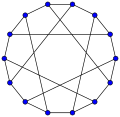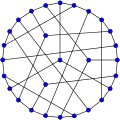In graph theory, the thickness of a graph G is the minimum number of planar graphs into which the edges of G can be partitioned. That is, if there exists...
11 KB (1,268 words) - 00:05, 18 April 2025
Look up thickness in Wiktionary, the free dictionary. Thickness may refer to: Thickness (graph theory) Thickness (geology), the distance across a layer...
583 bytes (110 words) - 18:49, 21 August 2018
In graph theory, a planar graph is a graph that can be embedded in the plane, i.e., it can be drawn on the plane in such a way that its edges intersect...
35 KB (4,541 words) - 18:29, 29 May 2025
Appendix:Glossary of graph theory in Wiktionary, the free dictionary. This is a glossary of graph theory. Graph theory is the study of graphs, systems of nodes...
109 KB (16,011 words) - 18:32, 30 April 2025
Book embedding (redirect from Book thickness)
the exact book thickness for complete graphs. The graphs with book thickness one are the outerplanar graphs. The graphs with book thickness at most two are...
68 KB (8,167 words) - 00:16, 5 October 2024
In graph theory, a k-degenerate graph is an undirected graph in which every subgraph has at least one vertex of degree at most k {\displaystyle k} . That...
31 KB (3,769 words) - 02:53, 17 March 2025
discrete and Euclidean geometries, graph theory, group theory, model theory, number theory, set theory, Ramsey theory, dynamical systems, and partial differential...
195 KB (20,069 words) - 07:07, 11 June 2025
mathematical field of graph theory, the Heawood graph is an undirected graph with 14 vertices and 21 edges, named after Percy John Heawood. The graph is cubic, and...
10 KB (1,001 words) - 06:23, 6 March 2025
In topological graph theory, an embedding (also spelled imbedding) of a graph G {\displaystyle G} on a surface Σ {\displaystyle \Sigma } is a representation...
13 KB (1,744 words) - 19:55, 12 October 2024
mathematical field of graph theory, the Shrikhande graph is a graph discovered by S. S. Shrikhande in 1959. It is a strongly regular graph with 16 vertices...
6 KB (606 words) - 16:09, 19 November 2023
field of graph theory, the Coxeter graph is a 3-regular graph with 28 vertices and 42 edges. It is one of the 13 known cubic distance-regular graphs. It is...
7 KB (732 words) - 02:05, 14 January 2025
mathematical field of graph theory, the Tutte–Coxeter graph or Tutte eight-cage or Cremona–Richmond graph is a 3-regular graph with 30 vertices and 45...
7 KB (686 words) - 18:29, 3 November 2024
In the mathematical field of graph theory, the Nauru graph is a symmetric, bipartite, cubic graph with 24 vertices and 36 edges. It was named by David...
11 KB (1,378 words) - 20:54, 8 February 2025
In graph theory, an n-dimensional De Bruijn graph of m symbols is a directed graph representing overlaps between sequences of symbols. It has mn vertices...
10 KB (1,049 words) - 17:59, 9 May 2025
In topological graph theory, a 1-planar graph is a graph that can be drawn in the Euclidean plane in such a way that each edge has at most one crossing...
24 KB (2,757 words) - 12:14, 12 August 2024
In the mathematical field of graph theory, the Desargues graph is a distance-transitive, cubic graph with 20 vertices and 30 edges. It is named after...
10 KB (1,203 words) - 11:19, 3 August 2024
In graph theory, a bramble for an undirected graph G is a family of connected subgraphs of G that all touch each other: for every pair of disjoint subgraphs...
8 KB (955 words) - 04:12, 25 September 2024
the number theory of quadratic residues, and have interesting properties that make them useful in graph theory more generally. Paley graphs are named after...
14 KB (1,745 words) - 00:02, 7 February 2025
Knot (mathematics) (redirect from Knots and graphs)
of mathematics that studies knots is known as knot theory and has many relations to graph theory. A knot is an embedding of the circle (S1) into three-dimensional...
23 KB (2,509 words) - 20:27, 30 April 2025
In the mathematical field of graph theory, the Grötzsch graph is a triangle-free graph with 11 vertices, 20 edges, chromatic number 4, and crossing number...
8 KB (980 words) - 07:15, 6 December 2023
In the mathematical field of graph theory, the Dyck graph is a 3-regular graph with 32 vertices and 48 edges, named after Walther von Dyck. It is Hamiltonian...
5 KB (440 words) - 01:17, 14 February 2025
field of graph theory, the Pappus graph is a bipartite, 3-regular, undirected graph with 18 vertices and 27 edges, formed as the Levi graph of the Pappus...
5 KB (598 words) - 04:24, 29 August 2023
Queue number (category Topological graph theory)
mathematical field of graph theory, the queue number of a graph is a graph invariant defined analogously to stack number (book thickness) using first-in first-out...
24 KB (2,715 words) - 13:33, 12 August 2024
graph is, in graph theory, a hypohamiltonian graph with 16 vertices and 27 edges. It has book thickness 3 and queue number 2. Hypohamiltonian graphs were...
2 KB (252 words) - 07:16, 6 December 2023
Szekeres snark (category Graph theory stubs)
In the mathematical field of graph theory, the Szekeres snark is a snark with 50 vertices and 75 edges. It was the fifth known snark, discovered by George...
2 KB (173 words) - 08:00, 18 November 2024
Double-star snark (category Graph theory stubs)
In the mathematical field of graph theory, the double-star snark is a snark with 30 vertices and 45 edges. In 1975, Rufus Isaacs introduced two infinite...
2 KB (206 words) - 07:53, 18 November 2024
mathematical field of graph theory, the McGee graph or the (3-7)-cage is a 3-regular graph with 24 vertices and 36 edges. The McGee graph is the unique (3...
5 KB (681 words) - 04:42, 12 May 2025
In the mathematical study of graph theory, a pancyclic graph is a directed graph or undirected graph that contains cycles of all possible lengths from...
14 KB (1,614 words) - 22:24, 20 October 2024
In the mathematical field of graph theory, the Klein graphs are two different but related regular graphs, each with 84 edges. Each can be embedded in...
6 KB (568 words) - 23:24, 24 April 2024
In the mathematical field of graph theory, the Hoffman graph is a 4-regular graph with 16 vertices and 32 edges discovered by Alan Hoffman. Published in...
3 KB (290 words) - 14:56, 7 October 2024
























